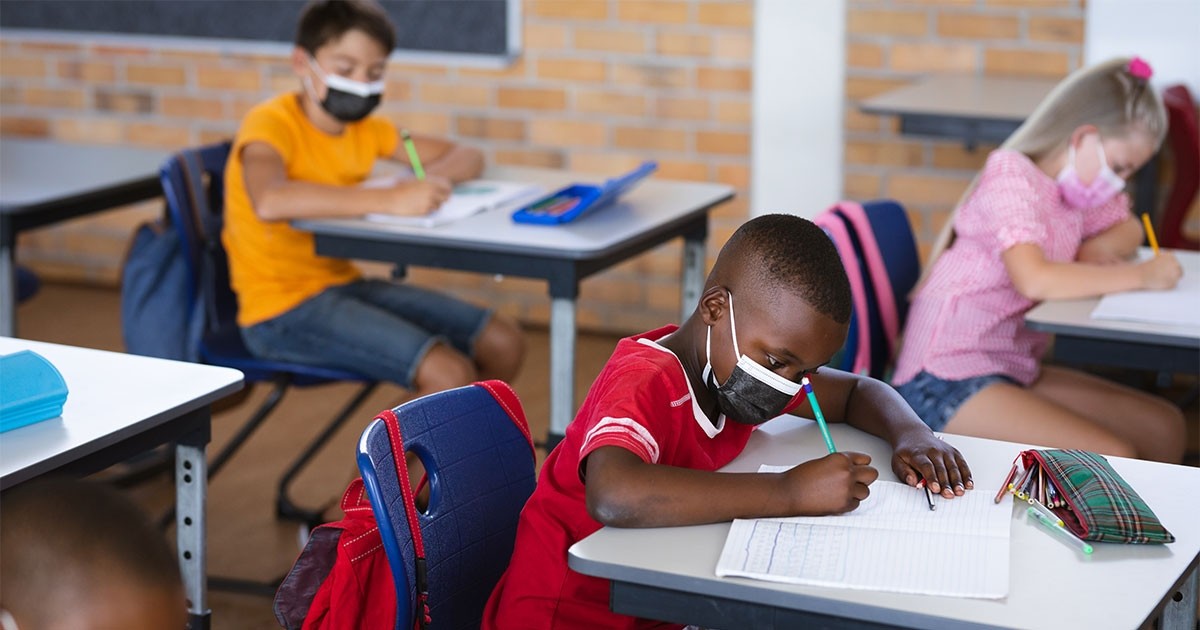
Cincinnati.com: Cincinnati Children's study: COVID-19 cases, quarantines lower in schools with mask mandates
Research by UC pediatrics expert says vaccines and masks can keep kids in the classroom
New research looking at COVID-19 caseloads in seven Cincinnati area schools attempted to learn whether universal masking really makes a difference. The study, lead by Katherine Auger, MD, of the Department of Pediatrics in the UC College of Medicine and associate chair of outcomes in the Department of Pediatrics at Cincinnati Children's shows that mask mandates are effective. In a story published on Cincinnati.com, the study found that the rate of students getting diagnosed with COVID-19 was 78% higher in the partially masked schools than those that had universal masking.
It also showed that the rate of students being quarantined was 60% higher in the partially masked schools and that the ratio of quarantines per COVID-19 case was 30% higher in the partially masked schools.

Katherine Auger, MD, of the Department of Pediatrics in the UC College of Medicine and associate chair of outcomes in the Department of Pediatrics at Cincinnati Children’s/Photo/Cincinnati Children's
The key takeaway is that the districts with universal masking had a significantly lower rate of COVID-19 cases, and quarantines were lower too.
"We were struck by how big that difference was," Auger said, especially in such a short period of time. The study was done in about three weeks, from the beginning of the school year to Sept. 7.
It has been Auger's job during the pandemic to focus on COVID-19 policies that affect children, including school closings, Cincinnati.com reported.
Auger's study used data from seven school districts with a total of 64,500 students. Three districts require universal masking (including one that switched to full masking after a week of school), four require masking for kids in kindergarten through sixth grade but not for kids in grades seven through 12. Five of the districts also provided the data on quarantines.
She told Cincinnati.com universal masking not only keeps unvaccinated students and staff safe from COVID-19, but is helpful to young children, who need to see role models in the adults and older students around them. And, it's less stressful for teenagers, who are saddled with worries about fitting in with other students.
"Masks work. They are effective. They do change the number of cases we see in schools. And masks are safe," she said.
Lead photo/CDC
Next Lives Here
The University of Cincinnati is classified as a Research 1 institution by the Carnegie Commission and is ranked in the National Science Foundation's Top-35 public research universities. UC's medical, graduate and undergraduate students and faculty investigate problems and innovate solutions with real-world impact. Next Lives Here.
Related Stories
High-dose vitamin C shows promise in pancreatic cancer treatment
December 17, 2024
The University of Cincinnati Cancer Center's Olugbenga Olowokure was featured in a Local 12 story discussing new research from the University of Iowa that suggests that high doses of vitamin C, when combined with standard chemotherapy, may significantly extend the life expectancy of patients with advanced pancreatic cancer.
Trend of restaurants closing continues
December 16, 2024
Dozens of restaurants in the Cincinnati region have closed in recent months, with a national chain shuttering locations this past weekend, WLWT reported. Erwin Erhardt, PhD, an associate professor - educator in the economics department at UC's Carl H. Lindner College of Business, said the restaurant industry has faced problems for years.
Transition clinic bridges gap in care for young people with...
December 16, 2024
Quincy, Illinois television station WGEM highlighted the University of Cincinnati's Physical Medicine and Rehabilitation transition clinic led by Jensine’ J. Clark that helps patients like Tamia Craig move from pediatric to adult care.
